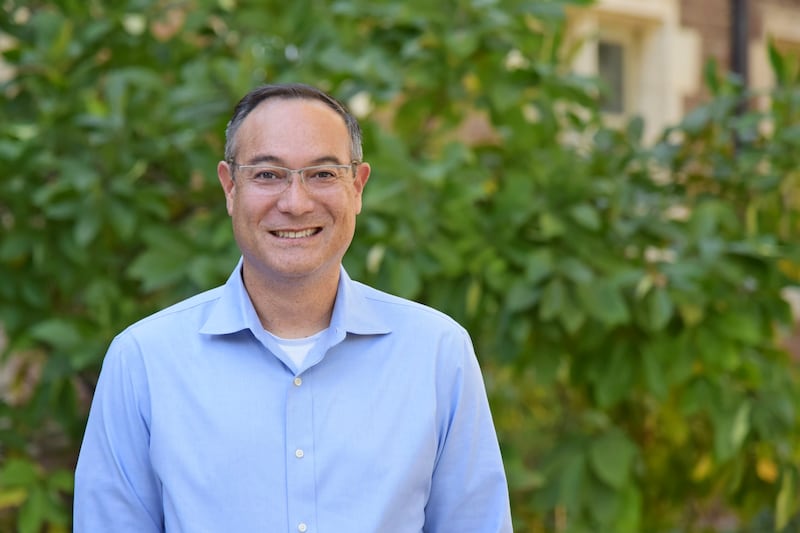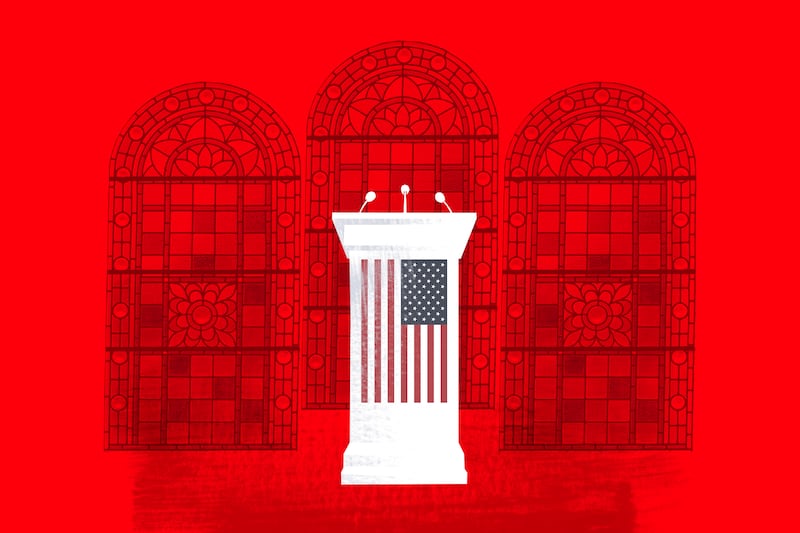How would you describe the position of evangelically oriented Christians in the United States right now? That’s what I asked religion and law professor John Inazu in our recent conversation on the “Interfaith America” podcast, wrapping into the conversation two sharply diverse but influential figures in American life: the late theologian and pastor Tim Keller and former President Donald Trump.
Inazu, the Sally D. Danforth Distinguished Professor of Law and Religion at Washington University in St. Louis, works at the intersection of the freedoms of speech, assembly and religion, and the legal and political theories related to those topics. His latest book, “Learning to Disagree: The Surprising Path to Navigating Differences with Empathy and Respect,” will be released next week.
In a diverse democracy, religion shows up in complex and interesting ways, and our conversation delved into what it means for him to be a civic interfaith leader working particularly with evangelical communities in a religiously diverse society, advancing both that community and American pluralism.
This excerpt of our conversation has been edited for clarity and length.
Eboo Patel: How would you describe the position of more evangelically oriented Christians in the United States right now? I want to frame this question with the passing of Tim Keller, a highly regarded, intellectually oriented evangelical pastor, theologian and writer, and Donald Trump, who is running for president again.
Keller’s passing and Trump’s formal announcement happened within just a few weeks of each other. I’m curious if we can frame the complexity of evangelically oriented Christians in America within those two bookends, so to speak.
John Inazu: It’s a great question. I think I have to back into it, though, by returning to my own racial identity first. As we were getting ready for this podcast, you texted me and you gave me the thumbs-up emoji, dark-colored thumbs up. It made me think, I don’t even know what color thumb to use given my biracial identity. When am I white? When am I Japanese? What do I project by using one or the other? It’s this confounding sense of my own racial identity. I mention that because some of the questions you’re asking about evangelicals are pretty particular to white evangelicals as a kind of intersectional description of a subset of Christians.
That’s because a lot of other Christians who might otherwise identify as something like evangelical but who aren’t in these largely white denominations or communities have had a very different experience with America, with Christianity. When you look at the Black church, when you look at a lot of immigrant churches, certainly a lot of Asian American churches, they’re differently situated than the kinds of churches that are going to be most receptive to the issues that you just named. Having said that, there’s an adjacency to all of this, and so there’s a resonance with what you’re talking about.
You mentioned Tim Keller, who was my mentor and someone I deeply respected. When I look at not only his voice but the way that he modeled a Christian engagement with the world around him and with the people in this country, it’s very hard to think about who replaces him with the same gravitas and stature and life that Tim shared. It is a key moment, I think, in this subset of evangelical culture.
Then to bring up the impending presidential election and the effect of Trump, I think this was another extremely significant moment for evangelicalism in America. We could talk a long time just about this, but probably one of the headlines would have to be the political flip-flop of a lot of especially conservative Christian leaders who back in the Clinton years were talking about the importance of morality and character to national leaders. By 2016 and Trump, that was off the table, and they were making really confounded and somewhat deeply inconsistent arguments as to why suddenly Trump was the guy to vote for.
There were a lot of splits around this, splits in families and friendship circles and ministries and denominations. There’s an intergenerational or a generational piece to all of this as well that’s very interesting to think about.
This is a moment, I think, especially for the subset of evangelical Christians who for many decades in this country have assumed a cultural baseline of knowledge that people would understand who they were and who they are.
That you could walk into a church service, a school or a grocery store, and pretty much everybody would have a basic sense of what Christianity is. They could name maybe the four gospels, so they would know something about the influence of Christianity on this country. That’s changing rapidly, and there are a lot of emotions and tensions and fears wrapped up in those changes. That’s the, I think, internal reflection and also, frankly, power struggles and power grabs that we see happening right now in evangelical culture.

EP: One of the things about evangelicals is you don’t have to go to this church, you choose. And so you can choose Donald Trump as your guy, or you can choose Tim Keller as your guy. We all know who Trump is. Tell us who Tim Keller is in just a few words. What made Tim Keller such an archetype of a particular kind of Christianity to a small segment of the Christian world? Then my follow-up question is, why don’t more people choose Tim Keller over Trump in your world?
JI: There’s so much that I can say about Tim as a person. He had a rare ability to translate complex ideas with absolute clarity and coherence to his audience. When he started Redeemer Presbyterian in Manhattan in the ‘80s, he knew that his audience wouldn’t understand him. I think part of his overall posture was presuming that he would have to make the case for what he was saying, but he would have to win over the audience in front of him. That shapes you to be a different communicator but also a different person. I think, very importantly, Tim was someone for whom celebrity never went to his head. He was very successful later in life.
That’s probably a key point. He publishes his first book when he is 58 years old. There’s something to this sense of maturity around the attention that Tim garnered that he just never seemed to take it that seriously.
That posture, both clear communication and real genuine humility, makes you a different kind of leader and positions you to engage with culture and those around you in a different way. I think part of this was also while Tim had a deep confidence in his faith and the message of the Christian gospel, he was always curious to learn from other people and to hear challenges to his own beliefs, and that’s a very different alternative.
EP: This is an interesting cultural text of the community. It’s an interesting sign of where things are.
JI: Yes. During the last year of Tim’s life, we were talking about the challenges of Christian formation and discipleship. How do you actually look at a generation of Christians, and through their habits and practices and what they do in the world, help them reflect what you understand to be the message of the Christian gospel? Importantly there, what I’m emphasizing is, what you do, what those habits are, are not necessarily what you say you believe.
I think what we’ve seen for a whole large segment of people ... who identify with this evangelical culture ... we’re realizing that what has formed them is not the Christian gospel, the Christian message or participation in Christian practices, but it’s formation by social media, by Fox News and by echo chambers. Evangelicals aren’t the only ones who are beholden to these kinds of echo chambers, but they’ve shown the world the deep impact of those kinds of formation.
At the end of the day, it’s more of a cultural influence than a theological one. It will take a long time to unpack that fully, but I think there’s pretty strong evidence that that’s the case.
John Inazu’s next book, “Learning to Disagree: The Surprising Path to Navigating Differences with Empathy and Respect,” will be released April 2.
Eboo Patel, the founder and president of Interfaith America, is a contributing writer for the Deseret News, the author of “We Need to Build: Field Notes for a Diverse Democracy” and the host of the podcast “Interfaith America with Eboo Patel.”


